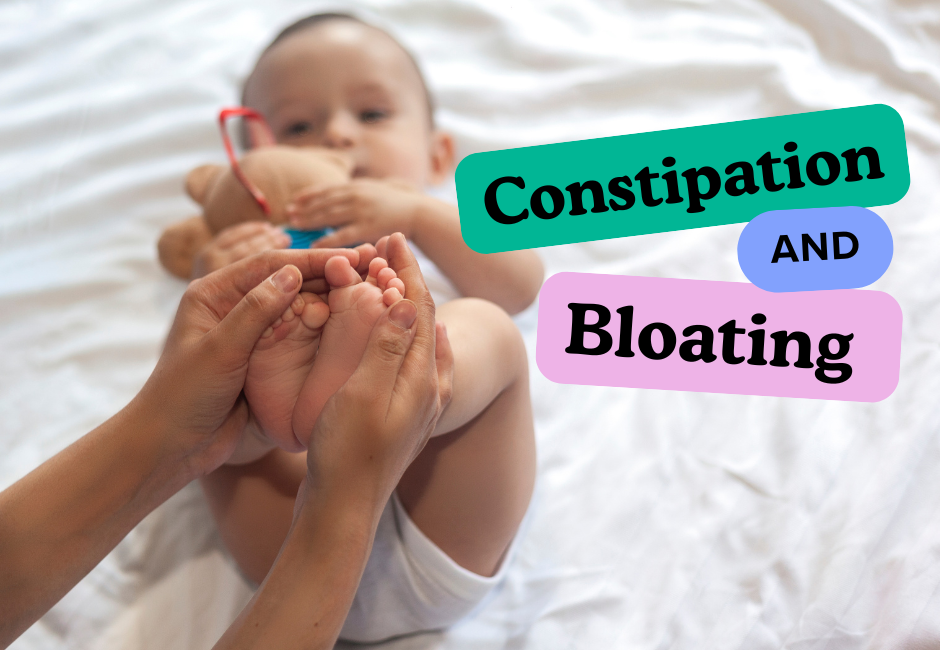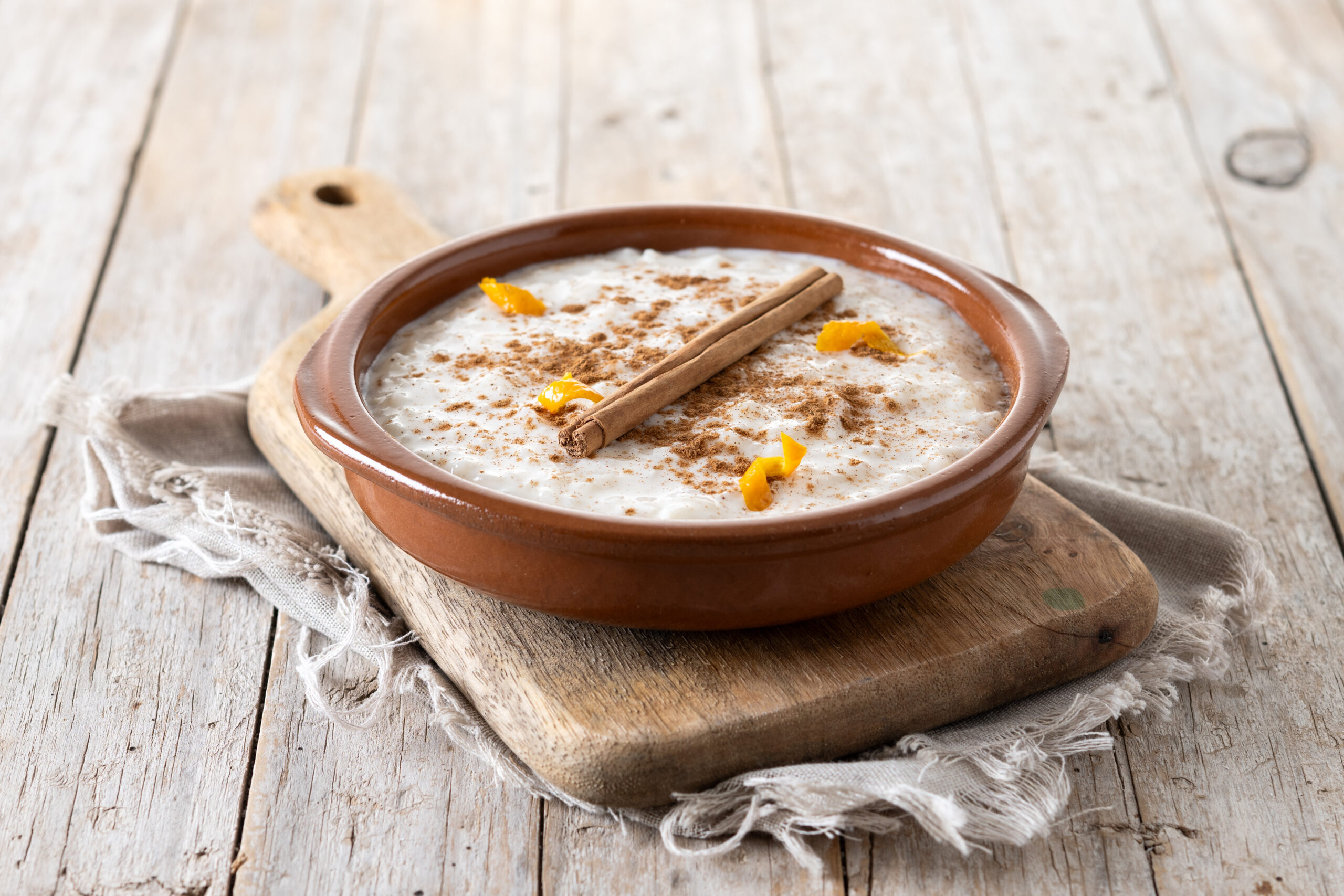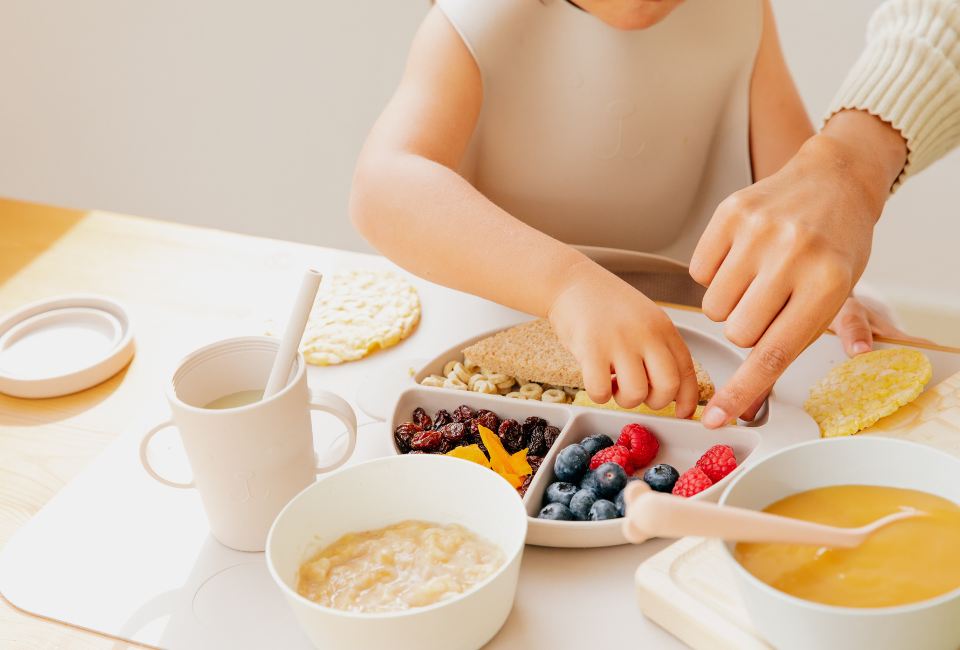
Constipation in babies is a common concern for many parents during the transition to solids. As your baby starts to eat solid foods, it’s important to support their digestive system to avoid discomfort. In this article, I’ll share practical tips to prevent and manage constipation. Also, I will share some remedies to help soothe your baby’s tummy when they experience bloating or discomfort.
Signs That Your Baby May Be Constipated
Recognizing the signs of constipation in babies can be tricky, especially since their digestive systems are still developing. However, paying attention to changes in their behavior and bowel movements can help you determine if constipation is the issue. Here are some additional signs that may indicate your baby is constipated:
Infrequent, Hard, or Dry Stools
One of the most common signs of constipation in babies is when their stools become hard, dry, or infrequent. If your baby’s bowel movements are more than 3 days apart or if the stool is difficult to pass, constipation is likely the cause. Babies typically have several bowel movements a day in the early months, so a sudden change to less frequent or harder stools could be a sign of constipation.
Painful Bowel Movements
If your baby cries, strains, or seems uncomfortable while trying to pass stools, they are likely constipated. Bowel movements should not cause excessive pain. If they do, your baby may be struggling with passing harder stools, which is a common sign of constipation.
Excessive Crying or Fussiness During Bowel Movements
Constipated babies might become especially fussy or irritable when they need to go to the bathroom. If your baby appears in pain while trying to poop—perhaps even arching their back or wriggling uncomfortably—that could be a sign that they are experiencing discomfort due to constipation. They may cry intensely while trying to push, which can be distressing for both baby and parents.
Straining, Arching the Back, or Pulling Their Legs Toward the Belly
During a bowel movement, you may notice your baby straining, arching their back, or pulling their legs up toward their belly. This is a common physical sign of constipation as babies try to relieve discomfort or push out stool. Straining is especially noticeable if your baby is trying for a long time to have a bowel movement but is unable to pass the stool.
Appetite Changes, Such as Refusal to Eat
Constipation can sometimes lead to a decrease in appetite. If your baby is suddenly refusing to eat or seems less interested in feeding, it could be because they are uncomfortable or full from bloating caused by constipation. Babies who are constipated might feel full or sluggish, making them less inclined to feed.
Abdominal Discomfort or Bloating
If your baby’s tummy feels hard to the touch or they seem unusually gassy, bloated, or gurgling, constipation could be the cause. A distended or firm belly can be an indication that your baby’s digestive system is backed up, and it’s causing discomfort. In some cases, babies may also experience mild to moderate pain in the abdomen while constipated.
Sleeping Issues
Constipation can sometimes disrupt your baby’s sleep patterns. If your baby seems restless, wakes up more frequently, or has trouble getting comfortable while sleeping, constipation could be affecting them. Babies who are uncomfortable from constipation may have difficulty relaxing enough to sleep soundly.
Lack of Relief After Bowel Movements
Sometimes, even after your baby does manage to have a bowel movement, they might not seem to find relief. They may continue to fuss or show signs of discomfort even after passing stool. This could mean that they are still struggling with constipation or that the stool passed was too hard or painful to relieve the discomfort entirely.
Stool with Mucus
While some mucus in your baby’s stool is normal, an increase in mucus or a noticeable stringy mucus may indicate constipation or gastrointestinal discomfort. The excess mucus may result from the colon becoming irritated or inflamed during the process of trying to pass stool.
Remedies for Constipated Babies
If your baby is already experiencing constipation, don’t worry—there are a few remedies you can try:

Increase Tummy Time
Tummy time is great for building muscle strength, but it also promotes digestion. Gently massaging your baby’s tummy while they’re on their belly can stimulate bowel movements. Make tummy time a regular part of your routine for both developmental and digestive benefits.
Try Prune or Pear Puree
If your baby is constipated, offer purees made with prunes or pears. Both fruits are known for their gentle laxative effect. I used prune puree with my baby during her transition, and it helped keep things moving without causing any discomfort.
Belly Massage and Bicycle Legs
Gentle belly massage can help relieve constipation by stimulating the intestines. You can also try the “bicycle legs” exercise by gently moving your baby’s legs in a cycling motion while they’re lying on their back. This can help release trapped gas and ease constipation.
Warm Bath
A warm bath can relax your baby’s muscles and help them pass stools more easily. I found that when my baby had trouble with bloating or constipation, a warm bath worked wonders to soothe her and promote digestion.
However, if the signs of constipation persist for more than a few days, or if you’re noticing your baby seems to be in significant pain, it’s essential to consult a pediatrician. They can help determine if the constipation is caused by something more serious or recommend additional treatments or strategies to help relieve your baby’s discomfort.
When to Seek Help and See a Doctor
While constipation in babies is fairly common, there are certain situations where you should consult a pediatrician. Here are a few signs to watch for:
Infrequent or Hard Stools
If your baby isn’t having regular bowel movements (more than 3 days without one) or is passing very hard stools, this may indicate constipation. If the condition persists, consult your doctor.
Extreme Fussiness or Discomfort
If your baby is particularly fussy during or after meals and seems to be in pain while passing stools, this could be a sign that they’re struggling with constipation. While some discomfort is normal, excessive fussiness can point to digestive issues.
Blood in Stools
If you notice blood in your baby’s stool or if your baby is having painful, straining bowel movements, seek medical advice immediately. This could indicate more serious issues that need attention.
Failure to Gain Weight or Growth Concerns
If constipation seems to be impacting your baby’s growth or appetite, this could be a red flag. Make sure your baby is gaining weight and growing as expected, and consult a doctor if you have concerns.
Tips to Avoid Constipation in Babies
Navigating the transition to solids can be a bit tricky when it comes to your baby’s digestive system, but with the right approach, you can help keep things running smoothly. Below are some effective tips that I followed with my baby, which helped prevent constipation while we introduced solids.
1. Start with Fiber-Rich Foods
Fiber is one of the most important elements for healthy digestion. When introducing solids, offering fiber-rich foods like apples, pears, prunes, and sweet potatoes can work wonders in preventing constipation. These fruits and vegetables are natural laxatives that help to soften stool and encourage regular bowel movements. I made sure to gradually introduce these foods to my baby’s diet, and I saw a noticeable improvement in her digestion. For example, prunes and pears are known for their ability to relieve constipation, and they quickly became some of her favorite foods!
2. Offer Plenty of Fluids
Staying hydrated is crucial for your baby’s digestion. Fluids help to soften stool and make it easier to pass. If you’re breastfeeding, continue nursing as often as possible since breast milk is made up of about 80% water, providing adequate hydration. Once you start introducing formula or solids, make sure to offer water with meals. At first, my baby wasn’t too keen on drinking water, but I kept offering small sips in a sippy cup, and eventually, she got used to it. Hydration played a huge role in preventing constipation, especially when transitioning to more solid foods. However, avoid offering juice to babies under 1. To learn more, check out our article on why juice isn’t recommended for babies under 1.
3. Introduce a Variety of Textures
To support your baby’s digestive system, it’s important to offer a variety of textures as you introduce solid foods. Start with smooth purees, then gradually transition to mashed foods, followed by small chunks and finger foods. This process helps your baby’s digestive system get used to different textures, and it strengthens their chewing muscles as they learn to process more solid foods. By diversifying the textures, you can prevent constipation while also promoting oral development. I was careful to pace the transition from purees to finger foods, which helped my baby’s digestion adjust smoothly. Want to know more about purees vs. baby-led weaning? Check out our article for helpful tips and advice on making the best choice for your little one!
4. Incorporate Probiotics
Probiotics are beneficial bacteria that help support your baby’s gut health and promote good digestion. Including probiotics in your baby’s diet can help prevent constipation and keep things moving regularly. You can start offering unsweetened yogurt after six months or probiotic drops (which are available in most pharmacies). I added probiotics to my baby’s routine early on, and I noticed they helped support her digestion, especially when we introduced more complex foods. Probiotics are a simple but effective way to maintain a healthy balance of gut bacteria and avoid digestive issues.
5. Maintain Regular Tummy Time
While this may seem unrelated to food, tummy time is essential for your baby’s overall development, including digestive health. Tummy time strengthens your baby’s abdominal muscles, which plays a role in helping move food through the digestive system. By encouraging tummy time every day, you can support your baby’s digestive function and help avoid issues like constipation. I made sure to incorporate tummy time into my baby’s daily routine. It worked wonders in strengthening her body for better digestion.
6. Be Mindful of New Foods
When you introduce new foods, it’s important to keep an eye out for any signs of constipation. A new food might be too heavy for your baby’s digestive system or cause a reaction. Introduce one food at a time and watch your baby’s response. If you notice that a certain food is contributing to constipation, you may want to reduce or eliminate it temporarily. For example, some babies find that bananas can sometimes cause constipation, while others handle them just fine. Paying attention to how your baby reacts can help you manage their diet more effectively.
7. Massage Your Baby’s Belly
Gentle belly massages can help relieve any discomfort caused by constipation and promote healthy digestion. I found that massaging my baby’s tummy in a circular motion helped her relax and made it easier for her to pass gas and stool. This soothing technique can be especially helpful if your baby is gassy or showing signs of mild bloating. Make sure to be gentle and only massage your baby’s belly after they’ve had a little rest following feeding.
Incorporating these tips into your routine can help prevent constipation and keep your baby’s digestion healthy as they start solids. This makes introducing new foods easier and less stressful for both of you.
Conclusion: Supporting Your Baby’s Digestive System
Supporting your baby’s digestive system during the transition to solids is essential for their comfort and well-being. By offering fiber-rich foods, staying mindful of hydration, and introducing a variety of textures, you can help prevent constipation and bloating. If your baby experiences constipation, remedies like prune purees, belly massage, and tummy time can provide relief. These foods support healthy digestion and keep things moving smoothly.
If you’re looking for more guidance on the best first fruits to introduce to your baby, take a look at my article on introducing fruits to your baby. You can also find helpful advice on the first vegetables to offer in my article on best veggies for babies, ensuring a balanced diet that promotes digestive health.
Remember, every baby is different, and it’s important to monitor your baby’s progress closely. If you ever have concerns, don’t hesitate to reach out to your pediatrician. And as always, feel free to leave your thoughts, questions, or stories about your own experience with constipation in babies in the comments below!
FAQs About Constipation in Babies
1. How can I prevent constipation in my baby when introducing solids?
Start with fiber-rich foods like pureed fruits and vegetables, offer plenty of fluids, and gradually introduce solid textures to engage your baby’s digestive system.
2. My baby is constipated. What can I do?
Try offering prune puree, giving your baby a gentle belly massage, increasing tummy time, and providing fluids. If the constipation persists, consult your pediatrician.
3. How long can constipation last in babies?
Constipation can last anywhere from a few days to a week, but if it continues or worsens, it’s important to speak with your pediatrician.
4. Is it normal for my baby to have trouble with constipation after starting solids?
Yes, many babies experience mild constipation as they transition to solids. However, consistent constipation should be addressed with the help of your pediatrician.
5. Can switching to solid foods cause constipation?
Yes, the introduction of solid foods can sometimes cause constipation. As your baby’s digestive system adjusts to new textures, some foods may lead to harder stools. Foods that are low in fiber, such as rice cereal or bananas, can contribute to constipation. Offering fiber-rich fruits, vegetables, and plenty of fluids can help ease the transition.
6. What are some natural remedies for constipation in babies?
Natural remedies for constipation in babies include offering small amounts of water, offering high-fiber foods like pears, prunes, and sweet potatoes, and gently massaging your baby’s belly. You can also try moving your baby’s legs in a bicycling motion to help relieve gas and discomfort. If the constipation persists, it’s important to consult a pediatrician before attempting any more advanced remedies.
7. Can baby constipation lead to other health problems?
Chronic constipation can sometimes lead to discomfort, irritability, and even refusal to eat, which may impact your baby’s growth and nutrition. In severe cases, untreated constipation can cause painful bowel movements and potential issues with your baby’s gut health. That’s why it’s important to identify and address constipation early on.
8. Should I stop offering solids if my baby is constipated?
If your baby is constipated, it’s generally a good idea to keep offering solids, but you may want to adjust the types of solids you’re giving. Offer more fiber-rich foods like prunes, pears, or peas, and ensure your baby is drinking enough fluids. However, if the constipation continues, it’s important to speak to your pediatrician before making any major changes to their diet.
















Leave a Reply